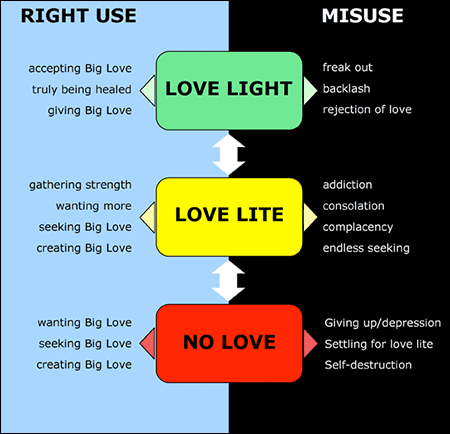

Two Secrets of Healing
by David Truman
• Careless love followed by loveless care
• Growing disillusionment with conventional healing and the rise of alternative healing
• Prescribing everything but love?
• Love is either sufficient or insufficient for healing
• Little contributions to a big problem
• Professionalism calls for Love Lite, even while healing absolutely requires Great Love
• Wanting Love: a side effect of therapy? (If so, good!)
• Resolving the Love Lite debate
• Go for the solution: Big Love. Life-sized love
Humanity's interest in healing and being healed has never been higher -- but the success rate of healing -- meaning, real, lasting healing -- is still abysmally low. The emphasis is on managing symptoms, while ignoring the fundamental disease that creates those symptoms. To truly cure what ails us, we need to understand what makes us sick -- and what can heal us.
1. Insufficient love is the root cause of disease. Insufficient love makes people sick, directly and indirectly.
2. Only love -- Great Love -- can fully and truly heal us. Popular healing methods have all failed miserably in addressing the real problem. Even alternative, or New Age, healing methods, which recognize the role of love in healing, don't provide love of healing quality and quantity. The best we get is "Love Lite" -- it may whet the appetite, but doesn't heal.
Dying of heartache
Insufficient love -- both received and given -- is humanity's core problem. Sick of loneliness, we are. Love-starved. Dying of heartache.
Why? We're experiencing an overall breakdown of intimacy in our culture.
What happened to love and intimacy? In modern society, selfishness rules. But at the same time, it practically rules love out. Or at least ruins it. People hurt themselves and their loved ones by acting egotistically, not lovingly, in love. And unfortunately, negative experience created by lack of love is thought of as love. Twisted love, dysfunctional love, but love nonetheless. Tragic error, that -- because if relationship and love are associated with pain, we get fear of love.
Love is the great healer. But what if we suffer from fear of love? Then obviously, that makes healing difficult.
Careless love followed by loveless care
In a world suffering from careless love, what comes next?
Unfortunately, loveless care!
Yes! We hire loveless (or love-poor) caregivers, hoping to mend the broken heart careless love left behind. But . . .
Do we really expect loveless care to heal us? Seriously?
A patient wants to get love out of a medical doctor, when even the doctor's wife can't get that. These doctors are masters of professional detachment: cold; overburdened; calloused.
And what about a psychotherapist? Psychotherapists have an extremely high suicide rate. Most of them are absolutely terrible at intimacy. And we're turning to them for love -- or for help with love? Get serious!
That's the vicious circle we're on. How do we escape it?
Growing disillusionment with conventional healing
and the rise of alternative healing
First, we need to see that popular healing methods are in no position to help us. The suffering public has lost confidence in the medical and psychological establishment, for many reasons.
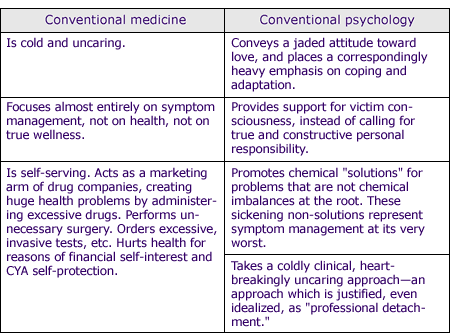

Hypocritical Oaths: client disservice in medicine
Fortunately, dissatisfaction with modern medicine and psychology has helped raise people's consciousness about illness. It is generally recognized, at last, that illness is a complex physical, emotional, even spiritual problem. Such is the holistic nature of health: body, mind, spirit.
That is, potentially, a great step forward. It opens the door for greater understanding of the core importance of love in the healing process. And it has given rise to a groundswell of "alternative" healing methods.
To their credit, many alternative therapies have even seen that the key issue in both psychology and spirituality is love. However, few healers have integrated the crucial importance of love into their methods, or into their recommendations to their clients.
Prescribing everything but love?
Why don't healers tell their clients the truth about what will heal them?
"LOVE will heal you. ONLY love."
Here's the hitch with that: People don't generally give advice to others that they themselves don't want to follow. That's why healers who are dysfunctional in relationship rarely tell their clients:
"To be healed, you need to love truly, and receive love truly"
-- even though that's the truth.
The thing is, even the would-be healers are afflicted with love phobia. So, consciously or otherwise, all the healers, even the "spiritual" ones, unconsciously downplay the real cause of illness -- the insufficiency of love and relationship -- and downplay the true cure -- abundant love.
That's foolish. It's madness. It's misleading. Healing must start with the truth.
Love Lite to the "rescue"
The alternative healing movement is perhaps culture's closest attempt to address the root cause of disease and do differently. At least, alternative healers talk about the healing power of love. But talk is cheap. So is Love Lite.
Love Lite fits almost everyone's emotional budget. Most healing clients could use a little love and, in many cases, a little love is all they could handle. Meanwhile, most healers are people who are willing to give a little love, and not much more. So their Love Lite is purposely limited -- circumscribed like a sandbox with tall walls. It's limited in a number of ways:
• Time. The healer meets the client by appointment only, and only till the predetermined time runs out.
• Money. If the client runs out of money, the healer will stop seeing them.
• Depth. The feeling the healer gives, the amount of emotion they are willing to invest, is strictly controlled, minimal.
Love is either sufficient or insufficient for healing
Love is a great healer. But great healing takes Great Love -- not Love Lite. Not casual, uncommitted love. Not selfish, undependable love. Not cold, professionally detached love. Great Love is generous, huge, committed. Great Love is an act of heartfelt, enduring loyalty. It's not minor, halfhearted love.
People don't quite believe love can or will heal them. Understandable. We're still talking about love-starved people in a love-poor society with love-poor healers, aren't we? Before enough power became available, people never thought a rocket could go into orbit, either.
Can love help a person escape the gravitational field of their despair, their personal insecurity, their heartache, their hollow leg? Absolutely. But the right amount of love is needed. Even when some love is offered, the quality and quantity of the love matters. It is either (a) sufficient, or (b) insufficient to heal the present ills.
As they say in AA, "The program only works if you work it." The program only works if you work it sufficiently.
This much we do know; we have the experience to prove it:
Love Lite is insufficient for healing.
Love in therapeutic doses
In order for love to heal, it must be supplied in therapeutic doses. Any MD will tell you, "No medicine works with too small a dose. Too little is often less than useless. So, when providing remedies, be sure you give enough to do the job."
Insufficient heat will never boil water. Insufficient power will never put a rocket into space. Insufficient love will never heal a person.
What do you feel when you're starving, and you get a bite to eat, but nothing more. Disappointed? Sure. Now you can see how dosage counts in the ministry of love.
That's why it is so very tragic that healers and clients are limited to offering and receiving the empty calories of Love Lite as the love component of their healing. Love is the greatest healer, but weak love, little love won't do the trick.
Little contributions to a big problem
If you go to any healer, you might get some love -- "Love Lite." Love Lite is about all that's offered in most healing contexts, even alternative healing. Maybe it will help?
When we give a little love, we think we are perhaps adding our contribution to many other sources of little love in this person's begging bowl. A little love here, a bit of love there; it all adds up, right? Yes. And we are contributing, right? Yes. But not the way we think. We are contributing to one big heartache.
You can easily understand why this way of love collection cannot work: If one were to have many boyfriends or many girlfriends, one after the other, none of them committed, that would surely create heartache. Likewise, if a child were to go from one foster home to another, none of them giving enough love, that child would not be happy, or grow up healthy.
The difference one can make
A little, a little, a little, adding up to nothing. Nothing but empty calories. So many zeros, but no one. No one responsible, no one committed. All those zeros need a one to give them meaning, substance, value. The heart needs to know:
"You are doing this work with me, and making money at it. But do you really care about me? Are you really committed to me? Are you really there for me?"
Professionalism calls for Love Lite, even while
healing absolutely requires Great Love
Have you heard the term "professional ethics"? Strange as it sounds, modern professional ethics virtually prohibits healers from giving Great Love. Why? Because in the popular mind, "Big Love kindles big egotism." And of course, unleashing egotism on one's client would be terribly inappropriate. (The only place it's "socially acceptable" to be egotistical is in one's private life, with friends and family.)
To put it plainly, here is the usual party line:
"Once a personal relationship begins it is impossible for your healer to act in the capacity of therapist. His or her impartiality and ego-less behavior towards you will by necessity end."
Monstrous professional detachment in reaction to monstrous ego
The concern is, and this concern is understandable enough, that when people are deeply involved in a relationship, they become more reactive. Therefore, it is presumed that professional healers can only stay on "good behavior" by staying out of love, by maintaining what is called professional detachment. They believe they would hurt their clients if they loved them more.
Thus, professional detachment is "required" by the (presumed) inevitability of egotistical behavior in those who invest big in love. Professional detachment rules out Great Love, and calls for no love at all, or at best Love Lite -- all to pre-empt the threat of egotism in love.
Admittedly, egotism, loss of objectivity, etc., that is not healing. It is not healing because it is unloving. But if we're talking about things of ego, are we still talking about love? No.
Unfortunately, in this world where ego rules, people cannot distinguish love from selfishness! That terrible confusion is the sad cornerstone upon which the satanic super-virtue known as professional detachment was built. How horrible, to admit that Great Love is the Great Healer, but then, at the same time, think that Great Love is harmful! That's insane. As a healer, you need to help the people get over this terrible contradiction:

Obviously, if the truth be told, what's dangerous is ego, not love. Healers need to be much less given to ego, and much more given to love. They need to be able to love without making an ego-mess of it.
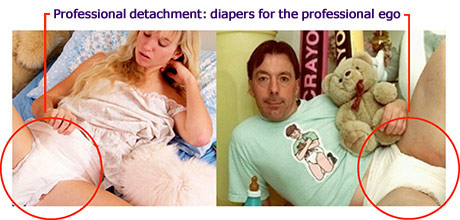
Conventional wisdom says, "Professional detachment prevents messes"
"Don't poo-poo on your client, dear. You know where we go poo-poo!" (Which is to say: "We act out egotistically in our NON-professional relationships. That's where we get to take a dump on people. Our clients don't DESERVE such lousy treatment. And besides, it's unprofessional!")
How considerate! With professional detachment securely fastened on the healer, the client is protected from shit. And for the healer, it must be comforting to be protected from emotional accidents before one is potty trained -- considerate again! But wouldn't self-mastery be much better? Consider this:
The supposed "key to success" -- professional detachment -- profoundly limits a healer's effectiveness at healing. Distanced therapeutic relationships fall far short of a love that could heal anyone. The heart standards for true love are so much higher. So, if professional detachment is "best behavior," we need still better behavior -- far better.
To fulfill the healer's calling
It takes Great Love to heal, remember? Is it not obvious that Great Love is the opposite of cold professional detachment, the opposite of loveless care? And, dare I say it? Great Love is personal, real, passionate -- passionately caring, committed, involved. Great Love is the opposite of all egoic patterns (all of which, friends, involve distance and withholding of life, love, and energy).
To actually be healed, people still need
personal love to fill the empty places this heartless world leaves behind.
And . . .
abundant love to establish the fullness upon which true well-being depends.
And . . .
the genuine vulnerability and the solid commitment that comes from the heart of a true lover.
And furthermore, as you well know . . .
That need isn't about to go away. Therefore, if healers are to truly fulfill their calling, they must be self-transcending enough to love and commit beyond reactivity.
Wanting Love: a side effect of therapy? (If so, good!)
Deep healing cannot happen until and unless healers can love the people enough to actually heal their broken souls, broken hearts -- and, of course, the people must accept that love, and return it. For complete healing, the client needs not to just receive love, but also give it.
![]()
For one thing, the engine of love is a reciprocating engine. By their mutual action -- the back-and-forth movement of energy and care -- its pistons generate huge healing power. Fall in love sometime, move with your beloved in the love dance, and see: The love that heals is a two-way love.
Besides, the soul needs to love. The heart needs to give love. And, to experience the precious fullness of living, back-and-forth love, dynamic participation is needed.
But unfortunately, the heartless dogma of professional detachment limits love from both sides, as this exchange shows:
Q: "I think I'm in love with my therapist. What's wrong with me? What should I do?"
Here comes the familiar, official, cold, professional answer:
A: "It is not unusual to feel strong feelings of 'love' or affinity toward your therapist. But those feelings probably aren't what you think. Psychodynamic theory suggests that generally, when people fall in love with their therapist, they are repeating emotional patterns they experienced as children toward their parents. This behavior and set of feelings was first described by Sigmund Freud who coined the term 'transference' to describe it. The process itself is a very real possible side effect of psychotherapy.
"Some cognitive-behavioral therapists, in their efforts to focus on empirically-based treatments, simply ignore these feelings when they come up in the course of psychotherapy. Others downplay their importance."
In fact, feelings of love toward one's therapist are very positive -- like the first pangs of hunger in a recovering patient. If more people allowed those feelings, and their therapists truly and responsibly loved them back, we'd start seeing the kind of miracle cures only love can cause.
A corny little cornucopia
Without Great Love, the best healers can do is manage symptoms. The truth is, symptom management is not healing. But generally, symptom relief is why people go to doctors, chiropractors, healers of all kinds. They hardly care whether their disease was cured. All that matters is whether their symptoms went away -- even for a short period of time.
Mark Twain understood short-term healing
"I've quit smoking, it's very easy to do;
I've done it hundreds of times."
- Mark Twain
Similarly, people love to be "healed" -- even to be healed over and over for the same malady. Now healed again, they crow, "My healer is so good, he's healed my headache problem hundreds of times!"
So today, a healer can say to the client, "You're all better." And for the moment, the client could actually believe it, more or less. But tomorrow they could begin to think of themselves as sick again -- and return to the condition of being sick.
Because their "healings" don't -- and can't -- provide lasting well-being, people become addicted to an endless search for new and hopefully more effective therapies. From conventional medicine, patients often demand new prescriptions, even elective surgeries. And when they turn to alternative healing, the menu of options is nearly endless. To list a few:
DNA Activation Therapy • Bio-Energetic Synchronization Technique (B.E.S.T.) • Scientific Prayer Reconstructive Gratitude • Colloidal Silver • Cranio-Sacral Balancing • Crystal Healing • Magnet Therapy • Ozone Therapy • Bio Scream Psychotherapy
That's a pretty corny little cornucopia, if that's our idea of how to get well. Anyone with half a brain can create a theoretical model that sounds effective, and anyone with half a brain might buy it. Deep desperation and cluelessness make people willing to buy products they don't need, and that are unlikely to work. All you have to do is convince them that this will solve a problem they have. For example:
"Basic DNA introduces ThetaHealing(tm) techniques and focuses on activating the 12 strands of DNA within each participant. The chronos, or youth and vitality chromosome is activated, the telomeres are strengthened to reverse the aging process, and students experience an opening to the Unconditional Love of the Creator."
Routinely, with alternative healing methods, people are led to expect magical relief and rescue for their money. But the proof is in the pudding. Or is it?
This clueless world has no real idea what good health truly is. Therefore, people tend to construe temporary relief of a single symptom as a successful healing -- "proving," presumably, the efficacy of the healer, the healing method, etc. It all adds up to this big picture of promiscuity and dysfunctionality, getting nowhere.
If it weren't still broken, would we still be trying to fix it?
This unconstructive pattern will end, as the following chart suggests, when people realize they need to give and receive more love of a better quality, and they finally start to heal.
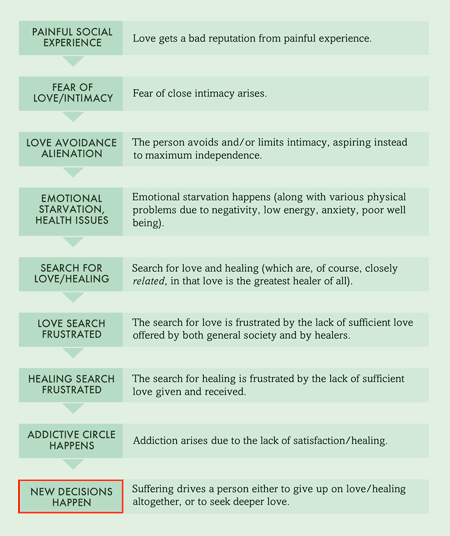
Love's time will come. The truth -- about what really works, what really doesn't work, and what works insufficiently, unsatisfactorily -- will eventually determine practice.
Eventually people are going to have to see that love is the greatest healer -- the only real healer -- and, it's going to take a great deal more love -- Great Love -- to do the healing. Then, seeing the truth and adapting accordingly, people will stop worrying about techniques, and start thinking about Big Love, and creating Big Love relationships for healing.
Resolving the Love Lite debate
Starvation creates hunger, and reduces appetite -- both at once. AND. . .
People who do not routinely exchange plentiful nurturing energy lose the ability to tolerate much of it.
BUT . . .
Is that a reason not to offer real food to starving people?
The debate is this: If the person can't handle all of what they need, is it better for them to have nothing, or is it better for them to have something?
Answer A: It's absolutely better to have nothing than to have something that's completely frustrating you, constantly reminding that you really are hopeless. Or, something that's just helping you cope with an unfulfilling status quo. In that case, a little love just makes everything worse. That argues for withholding Love Lite.
BUT . . .
Answer B: Wait a minute! If this person can only receive a penny's worth of love, they need that penny. And if they can't take more than that, must they be condemned to have nothing? So you become passionate in your conviction that Love Lite is needed, and it's way better than nothing.
When you look at both sides in the debate, you find yourself passionately agreeing with both. People need those strokes, those bite-sized bits of love. And they also need the despair of sitting alone enough to realize they don't have any source of strokes.
But neither will truly help unless the person makes right, productive use of the lessons of experience, both sweet and bitter . . .
Go for the solution: Big Love. life-sized Love
Live better. Love better. Until now, true and wholehearted love is only a theoretical possibility to which all of the healing methods point, but which virtually none of them actually recommend, much less engage in. And that, to me, is the lie of the entire healing business, whether psychological healing, metaphysical healing, or physical healing: They are extending a false promise of healing, when true and thorough healing is not even possible in the alienated context of love-poor living and giving. There is no real healing in lives devoid of true and loyal intimacy, fulfilling relationship. That's the truth.
What does it take to learn to exchange Big Love?
Practice. Deep practice. True practice.
Healers, and I've had contact with many, generally grow more dysfunctional in love as they go along. They tend to hide in their work from deeper, vulnerable love. They become encrusted with theory and belief. The result is atrophy and dysfunction. Ten years down the road from when they started, the usual healer is less ready for love than ever. And in another ten years, they'll be less ready again. Such is the reality of the situation. Usually; not necessarily.
The person may think, "I'm progressing socially, because instead of staying home, I'm venturing out and exchanging energy with my clients." But can one honestly say, "If I walk around the block once a day, I'll eventually be an Olympic champion -- or at least physically fit"? Absolutely not! Truthfully, if your total exercise program is walking around the block once a day, you'll eventually be terribly out of shape.
The progressive path, of modest exercise leading to more exercise, is best. It's the more exercise part that's truly effective -- and not just more exercise of the modest (middling) sort. That will be truly healing, truly healthy.
Live beyond the comfort zone
As you know, when your goal is mastery, merely rehearsing mistakes won't get you there. And neither will nursing limitations. For mastery, you'll need to stretch, live beyond that comfort zone. Walk clear away from the ego's "crutch pack" (limited love, control, emotional self-protectiveness, charging people for love, not committing more deeply); and love with far less conditions, rules, and strings attached. Go for it!
The way around is through. No one will ever gain competence in love except by facing love's challenges head on. The therapist both presents the challenges, and helps keep things straight. After all, what are friends and lovers for?
Love doesn't bow down to junk
The love that works -- indeed the love that truly IS love -- transcends ALL the self-protection garbage. It transcends all the ego garbage, the UNlove garbage. It doesn't bow down to junk. It marches to the beat of a higher drummer.
But that's dangerous!
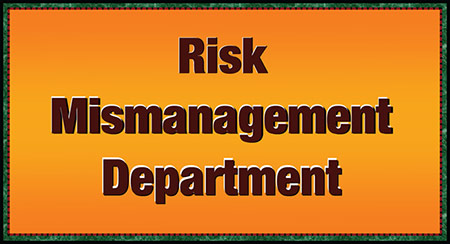
Love is dangerous, really? Well, so is a surgeon's scalpel. And so is a car. By the way . . .
Do you drive?
Well then, you must have made the effort to become a competent driver. Smart you are.
Similarly, why not become a competent lover? We justify our unwillingness by emphasizing the "safety" of Love Lite. All right, let's examine that excuse . . .
Exactly how safe is Love Lite? Remember, healing is impossible without Big Love; suffering and disease is inevitable. Do you call that safe? Exactly how safe is it that healing is impossible?
The danger of Love Lite
With Love Lite, neither the healer nor the client is getting the kind of deep exercise of the heart that would make them genuinely well. That's why neither healer nor client is ultimately healed by the exchange of Love Lite. It's just not enough.
Even while they have this I.V. drip of good vibrations that partially fills their hollow leg, they are atrophying in the heart. And that further erodes well-being. For true healing, that hollow leg needs to be filled to overflowing, and stay that way.
All those empty calories may help you limp along, but the more dependent you become on substitutes, the more you postpone handling the problems that keep you from having the Real Thing. The real thing is love -- Great Love.
Forget Love Lite. Try Love Right. Love Right is what? Unstinting.
It's not my place?
Question: Is it the PLACE of the healer to give Great Love?
Answer: Only if the healer really wants to HEAL people!
And: If YOU don't do it, who ELSE will do it?
Honestly! -- Do you really expect someone in common society to do it? Are you willing to bet your client's healing on that? You know the chances of that are slim to none -- and Slim, are you leaving town?
Traditionally, it is not considered the healer's "place" to give Great Love. And indeed, if the popular mind is consulted, even a lover should not really give Great Love. Which brings us back to the cause of disease, yes? But for the healer, the question remains: What are you going to do to heal people?
If you are to heal, you had better give your entire life to each and every client. (If they'll let you, that is.) Right now, you may not know how to give Big Love in the healing context, or how to avoid the problems it may reveal, but of this you can be sure:
AS LONG AS "therapeutic love" remains insufficient for the heart, the usual problems -- spiritual, emotional, and physical -- CAN'T and WON'T be solved by any healing approach.
Remember, the insufficiency of true, deep love in people's lives is the real cause of their diseases. That means, if you want to heal people, you had better love more -- much more. You'd better commit to loving 100%. Because, in reality,
You're either all of the solution, or you're part of the problem.
Thy will be done
For you theists out there, let's take a minute to consider God's will in the matter of love, and healing with love. God is love, you know. And honestly, it is certain that God would have us give Great Love. Surely, it is God's will that big, personal love be available everywhere on this planet.
Why? Because the Heart of God that beats in every breast needs that, and wants that. So, God Himself/Herself wants to give that to each child, and receive that from each child.
And why else? Because Great Love heals.
"If they cannot take how a human wants to love and be loved, how can they have this relationship with I? If they cannot be part of a relationship that is humanly satisfying, if they cannot give a love that is humanly satisfying, how indeed can they love God as God deserves to be loved? Or how indeed can they even feel worthy of any great love, if they do not in fact give that love which would satisfy a human heart?
"The heart is the heart; it all wants the same. It is My Heart. It is in every human. It is My Heart calling for that love."
Go for it
Healing results from heart satisfaction. Heart satisfaction results only from true, mutual love.
If you really want to heal people for good, you'd better give it your all. Be enough, or you're not enough. See?
Here are some articles to read that will help you
in your quest to learn deeper love:
The Evolution of Love, from Personal to Cosmic
How to Buy Happiness, by Being 100% Committed
by David Truman
Please feel free to share copies of this article.
We only ask that you mention its source.
- LoveTrust -
